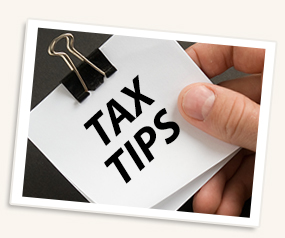Tax Tips and Tidbits
- Steven R. Anderson E.A.,
- Master Tax Advisor, H&R Block, Pawling, NY
This week’s Tax tips and Tidbits concerns record-keeping. If you want to keep your return audit proof, it’s a good idea to know what the IRS will be looking for. Here are some tidbits for you.
Which records should you keep? You should keep information that you and the IRS need to determine your correct tax. Everyone should keep the following records:
Copies of tax returns. Keep copies of your tax returns as part of your tax records.
- Your tax returns can help you prepare future returns and amended returns.
- After you die, copies of your tax returns and other records can be helpful to your survivors or the executor or administrator of your estate.
- Believe it or not, the IRS sometimes loses returns, and will write to you saying that they have not received a return. It won’t be enough to say to them, “I filed it, here’s proof, and go find it yourself!” The best way to handle that is to send them a copy along with the proof of filing. You can only do that if you have a copy! Don’t rely on your tax preparer to provide you with a second one! If you use an online product, make sure you either print a copy or keep a digital copy in a location where you can access it a few years down the road.
Proof of income and expenses. Listed below are examples of income and expense documents you should keep. The list is not all inclusive.
Income:
- Form(s) W-2, 1099, and K-1
- Bank and brokerage statements
- Business and hobby income records
- Records relating to sale of business property
Expenses
- Sales slips, invoices, receipts
- Cancelled checks or other proof of payment
Donations
- Details of cash and noncash contributions
- Written communications from qualified charities
Your Home
- Closing statements, including any refinance documents
- Purchase and sales invoices
- Receipts for improvements
- Insurance records
Investments
- Brokerage statements
- Mutual fund statements
- Form(s) 1099 and 2439
- Other basis documentation
IRAs
- Forms 1099-R, 5498, and 8606 for each year until all IRA funds have been distributed.
Records for Special Situations
Some items require specific records, in addition to the basic records of income and expenses.
- Alimony. If you pay or receive alimony, keep a copy of your written separation agreement or the divorce, separate maintenance, or support decree. If you pay alimony, you need to know your former spouse’s Social Security number.
- Business use of your home. Keep records that show which part of your home is used for business and the expenses related to that use. Child care providers should also keep track of hours open for business, as well as hours spent in preparation and clean up.
- Gambling. Keep an accurate diary of winnings and losses. Required information includes:
– Date and type of gambling activity.
– Gambling establishment name and address, and names of persons present with you.
– Amount you won or lost.
- Tax credits. Each tax credit includes special record requirements. Examples include:
– Provider’s name, address, and taxpayer ID number for the Dependent Care Credit.
– Physician’s certification for the Credit for the Elderly or the Disabled.
– School records for the education credits.
• Vehicle records. If you use your own car for business, medical transportation, or qualifying volunteer work, keep a mileage log that includes the date, destination, and purpose of each trip. You also need to know how many miles you drove for other purposes, such as commuting and personal use. Your vehicle records should include purchase or lease papers and loan records.
What is Proof of Payment?
The records you keep provide the documentation to support the deductions and expenses claimed on your tax return. You must always keep documentation of the reason for the payment. Other documents, such as statements and receipts, will help establish that the item is allowable on your tax return. Here’s a list of what you should keep, depending on how you paid:
Cash: Amount, payee name, transaction date
Check: Check number, amount, payee’s name, date the check was posted to your account
Debit or Credit Card: Amount charged, payee’s name, transaction date
Electronic Funds Transfer: Amount transferred, payee’s name, date, the transfer was posted to your account
Payroll Deduction Amount: payee code, transaction date
- Account statements. Account statements from your financial institution are acceptable as proof if they provide the information shown above.
- Pay statements. You may have deductible expenses withheld from your wages, such as union dues, medical insurance premiums, and charitable contributions.
Keep year-end or final pay statements to prove payment of these items.
- Mortgage interest. Form 1098, Mortgage Interest Statement, documents interest you paid. Be sure to verify that the amount is correct.
How Long Should You Keep Tax Records?
The IRS says you must keep your records for as long as they may be needed for the administration of any provision of the Internal Revenue Code, which means you must keep records of items shown on your return until the period of limitations for that return expires. The period of limitations is the time during which you can amend your return, claim a credit, or be assessed additional tax by the IRS. Below is a list of some general guidelines.
1) If you owe additional tax, and conditions 2, 3, and 4, below, don’t apply to you: 3 years after the return is filed.*
2) Omit income that is more than 25% of gross income on your return: 6 years after the return is filed.*
3) File a fraudulent return: Unlimited.
4) Do not file a return: Unlimited.
5) File a claim for credit or refund after filing* an original return: Later of 3 years, or 2 years after tax was paid.
6) File a claim for loss from worthless securities: 7 years after the return is filed.*
* A return that is filed early is treated as being filed on the due date of the return.
Asset Records
Keep records of acquisition date and cost basis for each business or investment asset until the period of limitations expires for the year in which you dispose of the asset. For example, suppose you sold a piece of business equipment in 2012 and you meet condition (1) above. You must then keep records of that asset until at least April 15, 2016 (three years after the due date for your 2012 tax return).
Electronic Records
Paper records take up a lot of space, and they can fade or be damaged. Many people prefer to keep electronic records instead of paper records. All requirements that apply to hard copy records apply to electronic records, including record retention periods. If you scan or otherwise transfer your tax records to an electronic format, you must be able to store, preserve, retrieve, and reproduce the records in a legible, readable format.
This written advice is not intended or written to be used, and it cannot be used, by any taxpayer for the purpose of avoiding penalties that may be imposed on the taxpayer.
H & R Block · 158 RT 22 Ste C2 (Hannaford Plaza), Pawling
Tel: (845) 855-1241 · e-Mail: standerson@hrblock.com


